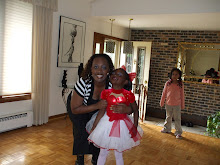Genocide among African women is growing at such a rapid pace. As I read, Ancestors Stone my heart went to these various women that have endured so much over the years. While reading the book my mind couldn't help to think about the silent killer among African women.
Three quarters of African women between the ages of 15-24 are infected with HIV. Here is one story:
There are days when Mary Mwasi does not know where she will find the strength to get out of bed. But sickness, exhaustion and despair will not feed the children or fetch the water, and so, somehow, she wills herself erect and steps into the sunlight of another Kenyan morning. "I have to look for food for the children day by day," she told a counselor for the US charity World Vision. "Life is difficult. Unless I get help from well-wishers, we cannot afford to eat."
Like many other residents of Ghaza, a village near the port city of Mombasa, Mrs. Mwasi is infected with HIV, the virus that causes AIDS. At least one of her three children is also HIV-positive and the others are often ill -- whether from the disease or malnutrition, she cannot be sure. Her husband left in search of work two years ago and never came back, so she lives on sufferance on her in-laws' land -- fearful that they will learn of her condition and expel her from the community. Her only financial assets are a few chickens, held in reserve to buy medicine for the kids.
She knows there is no hope for her. Her concern is for her children. "We say, 'When you pour water on the ground, you cannot pick it up again,'" Mary told the counselor. "I did not think of so many things before, so many worries. I am trying to leave everything to God."
As HIV/AIDS enters its third calamitous decade, Mary Mwasi's plight has become tragically common in East and Southern Africa, the regions hit hardest by the global epidemic. With 10 per cent of the world's population, impoverished sub-Saharan Africa is home to two-thirds of its HIV-positive population. But it is only recently that doctors, governments and the Joint UN Programme on HIV/AIDS (UNAIDS)* have realized that not only does the global struggle against AIDS have an African face, it is increasingly the face of an African woman. As infection rates mount, scientists and researchers are scrambling to understand the causes and to fashion new policies and programmes in response.
That is one Mary out of thousands. Each day many women have to make a decision to get medication, food or go without nothing. Why in a country so people died to get to we have women that are dying of HIV? Why do we have people fighting a war in Iraq, but not the war against HIV in Africa? Why can we go over take their land, people, customs, and traditions but we can't get over there to give them medicine?
www.un.org
www.avert.org
Resources for women living with HIV:
CDC-Info
Phone: 1-800-CDC-INFO
TTY: 188-232-6348
24hours/Day
Email: cdcinfo@cdc.gov
International Women's Health Coalition
333 Seventh Avenue,6th floor
New York, NY 10001
Women Alive
1566 Burnside Ave.
Los Angeles, CA 90019
Phone: 323-965-1564
Hot line: 1-800-554-4876
Thursday, October 30, 2008
Subscribe to:
Post Comments (Atom)

No comments:
Post a Comment